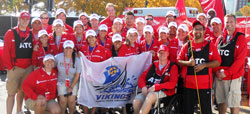������ϲʿ���ֱ�� Athletic Trainers, Physicians Staff Chicago Marathon

Athletic trainers assist athletes as they finish 26.2-mile course
CHICAGO (October 5, 2012) — Students, faculty, staff , alumni, and physicians with the ������ϲʿ���ֱ�� (ATEP) will be among more than 1,300 medical volunteers working at the October 7. About 30 current students from the North Park program, plus certified athletic trainers as well as other medical personnel, will meet participants as they cross the finish line, help them recover, and evaluate those that require a higher level of medical care.
Some 45,000 people are registered to participate in the Chicago Marathon, with about 34,000 to 37,000 people expected to compete, according to event organizers. Participants represent all 50 states and more than 100 countries.
The North Park ATEP has been involved with the Chicago Marathon for nearly a decade, providing current students, graduates, faculty, and staff a valuable laboratory experience, said , director of the University's ATEP and associate professor. "We are part of the 'sweep team,'" he said. "Every runner has to pass through the finish line chute. We are responsible for quickly evaluating their status, as well as attending to any 'runner down' medical calls."
Lundgren explained licensed professionals and the students will assist runners as their bodies return to a stable state following the grueling 26.2-mile marathon. If any participant needs additional medical care, that person is directed to one of two medical tents that effectively serve as a hospital. "We have enough cots to treat 110 patients simultaneously, and even have an intensive care unit built in," Lundgren said.
The University's relationship with the marathon originated with , now the medical director of the Chicago Marathon and , another Chicago race held in conjunction with St. Patrick's Day. Chiampas was a Fellow assigned to ������ϲʿ���ֱ��, where he learned about the University's ATEP.
"Dr. Chiampas approached us about staffing the finish line with athletic trainers. He said our skill sets were perfectly suited to differentiate what someone normally looks like after running 26.2 miles versus those runners that may be in medical distress," Lundgren said.
In addition, , current ������ϲʿ���ֱ�� athletic medical director and head team physician, is responsible for 21 aid stations throughout this year's marathon course. , head athletic trainer at ������ϲʿ���ֱ��, will lead the urgent care section of the medical tent. His workload is heavily dependent on the weather, he said. Since 2006, outside temperatures for the marathon have either been in the 40s or 80s. "We just can't seem to catch a break, and have ideal running conditions," Sjovall said. "As a result, we treat between 600 and 1,200 runners each race." Conditions that require treatment include hyperthermia, hypothermia, 'runner's collapse,' electrolyte imbalances, as well as cardiac and musculoskeletal conditions.
Former University athletic medical directors and team physicians, and former Fellows assigned to the University, are also volunteering at this year's marathon. Lundgren said he particularly enjoys the number of North Park athletic training alumni that return and volunteer for the marathon each year. "It really is amazing to see how many North Park connections are present within the Chicagoland medical community," he added.
In addition to the North Park ATEP students, faculty, staff, and alumni working at the marathon, some University students, faculty, and staff plan to run in the race.
Use @npunews to . For further information or resources, contact John Brooks, Director of Media Relations and News, or at (773) 244-5522. Learn more .
Next Steps
Learn more about and for students in the ATEP program.

